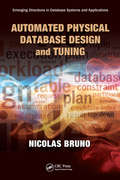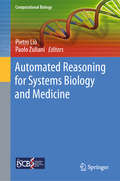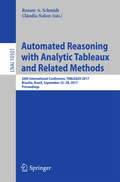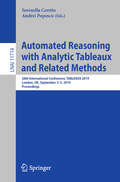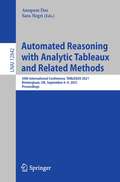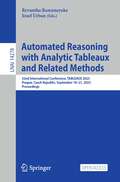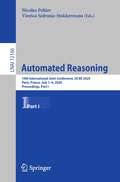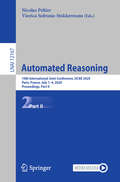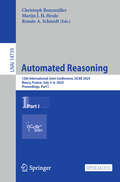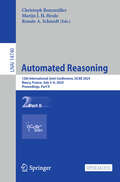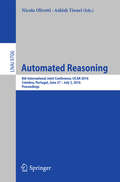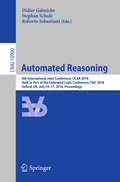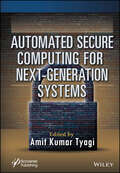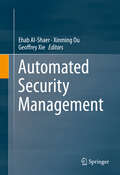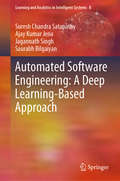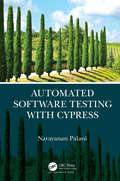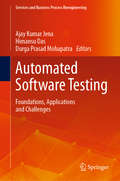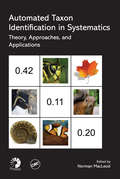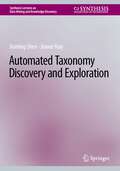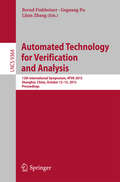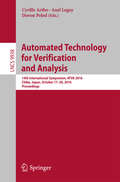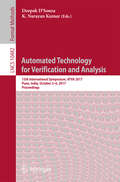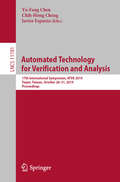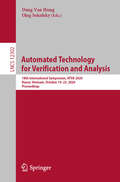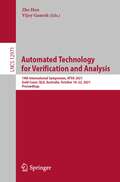- Table View
- List View
Automated Physical Database Design and Tuning (Emerging Directions in Database Systems and Applications)
by Nicolas BrunoDue to the increasing complexity in application workloads and query engines, database administrators are turning to automated tuning tools that systematically explore the space of physical design alternatives. A critical element of such tuning is physical database design since the choice of physical structures has a significant impact on the perfor
Automated Reasoning for Systems Biology and Medicine (Computational Biology #30)
by Pietro Liò Paolo ZulianiThis book presents outstanding contributions in an exciting, new and multidisciplinary research area: the application of formal, automated reasoning techniques to analyse complex models in systems biology and systems medicine. Automated reasoning is a field of computer science devoted to the development of algorithms that yield trustworthy answers, providing a basis of sound logical reasoning. For example, in the semiconductor industry formal verification is instrumental to ensuring that chip designs are free of defects (or “bugs”). Over the past 15 years, systems biology and systems medicine have been introduced in an attempt to understand the enormous complexity of life from a computational point of view. This has generated a wealth of new knowledge in the form of computational models, whose staggering complexity makes manual analysis methods infeasible. Sound, trusted, and automated means of analysing the models are thus required in order to be able to trust their conclusions. Above all, this is crucial to engineering safe biomedical devices and to reducing our reliance on wet-lab experiments and clinical trials, which will in turn produce lower economic and societal costs. Some examples of the questions addressed here include: Can we automatically adjust medications for patients with multiple chronic conditions? Can we verify that an artificial pancreas system delivers insulin in a way that ensures Type 1 diabetic patients never suffer from hyperglycaemia or hypoglycaemia? And lastly, can we predict what kind of mutations a cancer cell is likely to undergo? This book brings together leading researchers from a number of highly interdisciplinary areas, including: · Parameter inference from time series · Model selection · Network structure identification · Machine learning · Systems medicine · Hypothesis generation from experimental data · Systems biology, systems medicine, and digital pathology · Verification of biomedical devices “This book presents a comprehensive spectrum of model-focused analysis techniques for biological systems ...an essential resource for tracking the developments of a fast moving field that promises to revolutionize biology and medicine by the automated analysis of models and data.”Prof Luca Cardelli FRS, University of Oxford
Automated Reasoning with Analytic Tableaux and Related Methods: 26th International Conference, TABLEAUX 2017, Brasília, Brazil, September 25–28, 2017, Proceedings (Lecture Notes in Computer Science #10501)
by Renate A. Schmidt Cláudia NalonThis book contains the proceedings of the 26th International Conference on Automated Reasoning with Analytics Tableaux and Related Methods, TABLEAUX 2017, held in Bras#65533;lia, Bazil, in September 2017. The 19 contributed papers presented in this volume were carefully reviewed and selected from 27 submissions. They are organized in topical sections named: Sequent systems; tableaux; transitive closure and cyclic proofs; formalization and complexity. Also included are papers of three invited speakers.
Automated Reasoning with Analytic Tableaux and Related Methods: 28th International Conference, TABLEAUX 2019, London, UK, September 3-5, 2019, Proceedings (Lecture Notes in Computer Science #11714)
by Serenella Cerrito Andrei PopescuThis book constitutes the proceedings of the 28th International Conference on Automated Reasoning with Analytic Tableaux and Related Methods, TABLEAUX 2019, held in London, UK, in September 2019, colocated with the 12th International Symposium on Frontiers on Combining Systems, FroCoS 2019. The 25 full papers presented were carefully reviewed and selected from 43 submissions.They present research on all aspects of the mechanization of tableaux-based reasoning and related methods, including theoretical foundations, implementation techniques, systems development and applications. The papers are organized in the following topical sections: tableau calculi, sequent calculi, semantics and combinatorial proofs, non-wellfounded proof systems, automated theorem provers, and logics for program or system verification.
Automated Reasoning with Analytic Tableaux and Related Methods: 30th International Conference, TABLEAUX 2021, Birmingham, UK, September 6–9, 2021, Proceedings (Lecture Notes in Computer Science #12842)
by Sara Negri Anupam DasThis book constitutes the proceedings of the 30th International Conference on Automated Reasoning with Analytic Tableaux and Related Methods, TABLEAUX 2021, held in Birmingham, UK, in September 2021.The 23 full papers and 3 system descriptions included in the volume were carefully reviewed and selected from 46 submissions.They present research on all aspects of the mechanization of tableaux-based reasoning and related methods, including theoretical foundations, implementation techniques, systems development and applications. The papers are organized in the following topical sections: tableau calculi, sequent calculi, theorem proving, formalized proofs, non-wellfounded proofs, automated theorem provers, and intuitionistic modal logics.
Automated Reasoning with Analytic Tableaux and Related Methods: 32nd International Conference, TABLEAUX 2023, Prague, Czech Republic, September 18–21, 2023, Proceedings (Lecture Notes in Computer Science #14278)
by Josef Urban Revantha RamanayakeThis open access book constitutes the proceedings of the proceedings of the 32nd International Conference on Automated Reasoning with Analytic Tableaux and Related Methods, TABLEAUX 2023, held in Prague, Czech Republic, during September 18-21, 2023. The 20 full papers and 5 short papers included in this book together with 5 abstracts of invited talks were carefully reviewed and selected from 43 submissions. They present research on all aspects of the mechanization of reasoning with tableaux and related methods. The papers are organized in the following topical sections: tableau calculi; sequent calculi; theorem proving; non-wellfounded proofs; modal logics; linear logic and MV-algebras; separation logic; and first-order logics.
Automated Reasoning: 10th International Joint Conference, IJCAR 2020, Paris, France, July 1–4, 2020, Proceedings, Part I (Lecture Notes in Computer Science #12166)
by Nicolas Peltier Viorica Sofronie-StokkermansThis two-volume set LNAI 12166 and 12167 constitutes the refereed proceedings of the 10th International Joint Conference on Automated Reasoning, IJCAR 2020, held in Paris, France, in July 2020.* In 2020, IJCAR was a merger of the following leading events, namely CADE (International Conference on Automated Deduction), FroCoS (International Symposium on Frontiers of Combining Systems), ITP (International Conference on Interactive Theorem Proving), and TABLEAUX (International Conference on Analytic Tableaux and Related Methods).The 46 full research papers, 5 short papers, and 11 system descriptions presented together with two invited talks were carefully reviewed and selected from 150 submissions. The papers focus on the following topics: Part I: SAT; SMT and QBF; decision procedures and combination of theories; superposition; proof procedures; non classical logics Part II: interactive theorem proving/ HOL; formalizations; verification; reasoning systems and tools*The conference was held virtually due to the COVID-19 pandemic. Chapter ‘Constructive Hybrid Games’ is available open access under a Creative Commons Attribution 4.0 International License via link.springer.com.
Automated Reasoning: 10th International Joint Conference, IJCAR 2020, Paris, France, July 1–4, 2020, Proceedings, Part II (Lecture Notes in Computer Science #12167)
by Nicolas Peltier Viorica Sofronie-StokkermansThis two-volume set LNAI 12166 and 12167 constitutes the refereed proceedings of the 10th International Joint Conference on Automated Reasoning, IJCAR 2020, held in Paris, France, in July 2020.* In 2020, IJCAR was a merger of the following leading events, namely CADE (International Conference on Automated Deduction), FroCoS (International Symposium on Frontiers of Combining Systems), ITP (International Conference on Interactive Theorem Proving), and TABLEAUX (International Conference on Analytic Tableaux and Related Methods).The 46 full research papers, 5 short papers, and 11 system descriptions presented together with two invited talks were carefully reviewed and selected from 150 submissions. The papers focus on the following topics:Part I: SAT; SMT and QBF; decision procedures and combination of theories; superposition; proof procedures; non classical logicsPart II: interactive theorem proving/ HOL; formalizations; verification; reasoning systems and tools*The conference was held virtually due to the COVID-19 pandemic. Chapter ‘A Fast Verified Liveness Analysis in SSA Form’ is available open access under a Creative Commons Attribution 4.0 International License via link.springer.com.
Automated Reasoning: 12th International Joint Conference, IJCAR 2024, Nancy, France, July 3–6, 2024, Proceedings, Part I (Lecture Notes in Computer Science #14739)
by Renate A. Schmidt Christoph Benzmüller Marijn J. H. HeuleThis two-volume set of LNAI 14739-14740 constitute the proceedings of the 12th International Joint Conference on Automated Reasoning, IJCAR 2024, held in Nancy, France, during July 3-6, 2024. The 39 full research papers and 6 short papers presented in this book were carefully reviewed and selected from 115 submissions. The papers focus on the following topics: theorem proving and tools; SAT, SMT and Quantifier Elimination; Intuitionistic Logics and Modal Logics; Calculi, Proof Theory and Decision Procedures; and Unification, Rewriting and Computational Models. This book is open access.
Automated Reasoning: 12th International Joint Conference, IJCAR 2024, Nancy, France, July 3–6, 2024, Proceedings, Part II (Lecture Notes in Computer Science #14740)
by Renate A. Schmidt Christoph Benzmüller Marijn J. H. HeuleInfotext (nur auf Basis des Vorgängers): This two-volume set of LNAI 14739-14740 constitute the proceedings of the 12th International Joint Conference on Automated Reasoning, IJCAR 2024, held in Nancy, France, during July 3-6, 2024. The 39 full research papers and 6 short papers presented in this book were carefully reviewed and selected from 115 submissions. The papers focus on the following topics: theorem proving and tools; SAT, SMT and Quantifier Elimination; Intuitionistic Logics and Modal Logics; Calculi, Proof Theory and Decision Procedures; and Unification, Rewriting and Computational Models. This book is open access.
Automated Reasoning: 8th International Joint Conference, IJCAR 2016, Coimbra, Portugal, June 27 – July 2, 2016, Proceedings (Lecture Notes in Computer Science #9706)
by Nicola Olivetti Ashish TiwariThis book constitutes the refereed proceedings of the 8th International Joint Conference on Automated Reasoning, IJCAR 2016, held in Coimbra, Portugal, in June/July 2016. IJCAR 2014 was a merger of three leading events in automated reasoning, namely CADE (International Conference on Automated Deduction), FroCoS (International Symposium on Frontiers of Combining Systems) and TABLEAUX (International Conference on Automated Reasoning with Analytic Tableaux and Related Methods). The 26 revised full research papers and 9 system descriptions presented together with 4 invited talks were carefully reviewed and selected from 79 submissions. The papers have been organized in topical sections on satisfiability of Boolean formulas, satisfiability modulo theory, rewriting, arithmetic reasoning and mechanizing mathematics, first-order logic and proof theory, first-order theorem proving, higher-order theorem proving, modal and temporal logics, non-classical logics, and verification.
Automated Reasoning: 9th International Joint Conference, IJCAR 2018, Held as Part of the Federated Logic Conference, FloC 2018, Oxford, UK, July 14-17, 2018, Proceedings (Lecture Notes in Computer Science #10900)
by Stephan Schulz Didier Galmiche Roberto SebastianiThis book constitutes the refereed proceedings of the 9th International Joint Conference on Automated Reasoning, IJCAR 2018, held in Oxford, United Kingdom, in July 2018, as part of the Federated Logic Conference, FLoC 2018. In 2018, IJCAR unites CADE, TABLEAUX, and FroCoS, the International Symposium on Frontiers of Combining Systems, and, for the fourth time, is part of the Federated Logic Conference.The 38 revised full research papers and 8 system descriptions presented together with two invited talks were carefully reviewed and selected from 108 submissions. The papers focus on topics such as logics, deductive systems, proof-search methods, theorem proving, model checking, verification, formal methods, and program analysis.
Automated Secure Computing for Next-Generation Systems
by Amit Kumar TyagiAUTOMATED SECURE COMPUTING FOR NEXT-GENERATION SYSTEMS This book provides cutting-edge chapters on machine-empowered solutions for next-generation systems for today’s society. Security is always a primary concern for each application and sector. In the last decade, many techniques and frameworks have been suggested to improve security (data, information, and network). Due to rapid improvements in industry automation, however, systems need to be secured more quickly and efficiently. It is important to explore the best ways to incorporate the suggested solutions to improve their accuracy while reducing their learning cost. During implementation, the most difficult challenge is determining how to exploit AI and ML algorithms for improved safe service computation while maintaining the user’s privacy. The robustness of AI and deep learning, as well as the reliability and privacy of data, is an important part of modern computing. It is essential to determine the security issues of using AI to protect systems or ML-based automated intelligent systems. To enforce them in reality, privacy would have to be maintained throughout the implementation process. This book presents groundbreaking applications related to artificial intelligence and machine learning for more stable and privacy-focused computing. By reflecting on the role of machine learning in information, cyber, and data security, Automated Secure Computing for Next-Generation Systems outlines recent developments in the security domain with artificial intelligence, machine learning, and privacy-preserving methods and strategies. To make computation more secure and confidential, the book provides ways to experiment, conceptualize, and theorize about issues that include AI and machine learning for improved security and preserve privacy in next-generation-based automated and intelligent systems. Hence, this book provides a detailed description of the role of AI, ML, etc., in automated and intelligent systems used for solving critical issues in various sectors of modern society. Audience Researchers in information technology, robotics, security, privacy preservation, and data mining. The book is also suitable for postgraduate and upper-level undergraduate students.
Automated Security Management
by Ehab Al-Shaer Xinming Ou Geoffrey XieIn this contributed volume, leading international researchers explore configuration modeling and checking, vulnerability and risk assessment, configuration analysis, and diagnostics and discovery. The authors equip readers to understand automated security management systems and techniques that increase overall network assurability and usability. These constantly changing networks defend against cyber attacks by integrating hundreds of security devices such as firewalls, IPSec gateways, IDS/IPS, authentication servers, authorization/RBAC servers, and crypto systems. Automated Security Management presents a number of topics in the area of configuration automation. Early in the book, the chapter authors introduce modeling and validation of configurations based on high-level requirements and discuss how to manage the security risk as a result of configuration settings of network systems. Later chapters delve into the concept of configuration analysis and why it is important in ensuring the security and functionality of a properly configured system. The book concludes with ways to identify problems when things go wrong and more. A wide range of theoretical and practical content make this volume valuable for researchers and professionals who work with network systems.
Automated Software Engineering: A Deep Learning-Based Approach (Learning and Analytics in Intelligent Systems #8)
by Suresh Chandra Satapathy Ajay Kumar Jena Jagannath Singh Saurabh BilgaiyanThis book discusses various open issues in software engineering, such as the efficiency of automated testing techniques, predictions for cost estimation, data processing, and automatic code generation. Many traditional techniques are available for addressing these problems. But, with the rapid changes in software development, they often prove to be outdated or incapable of handling the software’s complexity. Hence, many previously used methods are proving insufficient to solve the problems now arising in software development. The book highlights a number of unique problems and effective solutions that reflect the state-of-the-art in software engineering. Deep learning is the latest computing technique, and is now gaining popularity in various fields of software engineering. This book explores new trends and experiments that have yielded promising solutions to current challenges in software engineering. As such, it offers a valuable reference guide for a broad audience including systems analysts, software engineers, researchers, graduate students and professors engaged in teaching software engineering.
Automated Software Testing with Cypress
by Narayanan PalaniUnit Integration Testing (UIT) had been a challenge because there was no tool that could help in XHR programming and unit integration validations in an efficient way until Cypress arrived. Cypress started releasing versions in 2015 and became popular in 2018 with version 2.0.0. This book explores Cypress scripts that help implement ‘shift left testing’, which is a dream come true for many software testers. Shift left occurs in the majority of testing projects, but could not be implemented fully because tools were unavailable and knowledge was lacking about the possibilities of testing early in the life cycle. Shift left is a key testing strategy to help testing teams focus less on defect identifications and more on developing practices to prevent defects. Cypress scripts can help front-end developers and quality engineers to work together to find defects soon after web components are built. These components can be tested immediately after they are built with Cypress Test Driven Development (TDD) scripts. Thus, defects can be fixed straight away during the development stage. Testing teams do not have to worry about finding these same defects in a later development stage because Cypress tests keep verifying components in the later stages. Defect fixing has become much cheaper with Cypress than when other tools are used. The book also covers Behaviour Driven Development (BDD)-based Gherkin scripts and the Cypress Cucumber preprocessor, which can improve test scenario coverage. Automated Software Testing with Cypress is written to fulfil the BDD and TDD needs of testing teams. Two distinct open source repositories are provided in Github to help start running Cypress tests in no time!
Automated Software Testing: Foundations, Applications and Challenges (Services and Business Process Reengineering)
by Durga Prasad Mohapatra Himansu Das Ajay Kumar JenaThis book covers both theory and applications in the automation of software testing tools and techniques for various types of software (e.g. object-oriented, aspect-oriented, and web-based software). When software fails, it is most often due to lack of proper and thorough testing, an aspect that is even more acute for object-oriented, aspect-oriented, and web-based software. Further, since it is more difficult to test distributed and service-oriented architecture-based applications, there is a pressing need to discuss the latest developments in automated software testing. This book discusses the most relevant issues, models, tools, challenges, and applications in automated software testing. Further, it brings together academic researchers, scientists, and engineers from a wide range of industrial application areas, who present their latest findings and identify future challenges in this fledging research area.
Automated Taxon Identification in Systematics: Theory, Approaches and Applications
by Norman MacLeodThe automated identification of biological objects or groups has been a dream among taxonomists and systematists for centuries. However, progress in designing and implementing practical systems for fully automated taxon identification has been frustratingly slow. Regardless, the dream has never died. Recent developments in computer architectures an
Automated Taxonomy Discovery and Exploration (Synthesis Lectures on Data Mining and Knowledge Discovery)
by Jiawei Han Jiaming ShenThis book provides a principled data-driven framework that progressively constructs, enriches, and applies taxonomies without leveraging massive human annotated data. Traditionally, people construct domain-specific taxonomies by extensive manual curations, which is time-consuming and costly. In today’s information era, people are inundated with the vast amounts of text data. Despite their usefulness, people haven’t yet exploited the full power of taxonomies due to the heavy curation needed for creating and maintaining them. To bridge this gap, the authors discuss automated taxonomy discovery and exploration, with an emphasis on label-efficient machine learning methods and their real-world usages. Taxonomy organizes entities and concepts in a hierarchy way. It is ubiquitous in our daily life, ranging from product taxonomies used by online retailers, topic taxonomies deployed by news outlets and social media, as well as scientific taxonomies deployed by digital libraries across various domains. When properly analyzed, these taxonomies can play a vital role for science, engineering, business intelligence, policy design, e-commerce, and more. Intuitive examples are used throughout enabling readers to grasp concepts more easily.
Automated Technology for Verification and Analysis: 13th International Symposium, ATVA 2015, Shanghai, China, October 12-15, 2015, Proceedings (Lecture Notes in Computer Science #9364)
by Bernd Finkbeiner Geguang Pu Lijun ZhangThis book constitutes the proceedings of the 13th International Symposium on Automated Technology for Verification and Analysis, ATVA 2015, held in Shanghai, China, in October 2015. The 27 revised papers presented together with 6 tool papers in this volume were carefully reviewed and selected from 95 submissions. They show current research on theoretical and practical aspects of automated analysis, verification and synthesis by providing an international forum for interaction among the researchers in academia and industry.
Automated Technology for Verification and Analysis: 14th International Symposium, ATVA 2016, Chiba, Japan, October 17-20, 2016, Proceedings (Lecture Notes in Computer Science #9938)
by Cyrille Artho Axel Legay Doron PeledThis book constitutes the proceedings of the 14th International Symposium on Automated Technology for Verification and Analysis, ATVA 2016, held in Chiba, Japan, in October 2016. The 31 papers presented in this volume were carefully reviewed and selected from 82 submissions. They were organized in topical sections named: keynote; Markov models, chains, and decision processes; counter systems, automata; parallelism, concurrency; complexity, decidability; synthesis, refinement; optimization, heuristics, partial-order reductions; solving procedures, model checking; and program analysis.
Automated Technology for Verification and Analysis: 15th International Symposium, ATVA 2017, Pune, India, October 3–6, 2017, Proceedings (Lecture Notes in Computer Science #10482)
by Deepak D’souza K. Narayan KumarThis book constitutes the refereed proceedings of the 15th International Symposium on Automated Technology for Verification and Analysis, ATVA 2017, held in Pune, India, in October 2017. The 22 full and 7 short papers presented in this volume were carefully reviewed and selected from 78 submissions. The book also contains one invited talk in full-paper length. The contributions are organized in topical sections named: program analysis; model checking and temporal logics; neural networks; learning and invariant synthesis; and hybrid systems and control.
Automated Technology for Verification and Analysis: 17th International Symposium, ATVA 2019, Taipei, Taiwan, October 28–31, 2019, Proceedings (Lecture Notes in Computer Science #11781)
by Javier Esparza Yu-Fang Chen Chih-Hong ChengThis book constitutes the refereed proceedings of the 17th International Symposium on Automated Technology for Verification and Analysis, ATVA 2019, held in Taipei, Taiwan in October 2019.The 24 regular papers presented together with 3 tool papers were carefully reviewed and selected from 65 submissions. The symposium is dedicated to the promotion of research on theoretical and practical aspects of automated analysis, verification and synthesis by providing a forum for interaction between the regional and the international research communities and industry in the field. The papers focus on cyber-physical systems; runtime techniques; testing; automata; synthesis; stochastic systems and model checking.
Automated Technology for Verification and Analysis: 18th International Symposium, ATVA 2020, Hanoi, Vietnam, October 19–23, 2020, Proceedings (Lecture Notes in Computer Science #12302)
by Dang Van Hung Oleg SokolskyThis book constitutes the refereed proceedings of the 18th International Symposium on Automated Technology for Verification and Analysis, ATVA 2020, held in Hanoi, Vietnam, in October 2020. The 27 regular papers presented together with 5 tool papers and 2 invited papers were carefully reviewed and selected from 75 submissions. The symposium is dedicated to promoting research in theoretical and practical aspects of automated analysis, verification and synthesis by providing an international venue for the researchers to present new results. The papers focus on neural networks and machine learning; automata; logics; techniques for verification, analysis and testing; model checking and decision procedures; synthesis; and randomization and probabilistic systems.
Automated Technology for Verification and Analysis: 19th International Symposium, ATVA 2021, Gold Coast, QLD, Australia, October 18–22, 2021, Proceedings (Lecture Notes in Computer Science #12971)
by Zhe Hou Vijay GaneshThis book constitutes the refereed proceedings of the 19th International Symposium on Automated Technology for Verification and Analysis, ATVA 2021, held in Gold Coast, Australia in October 2021. The symposium is dedicated to promoting research in theoretical and practical aspects of automated analysis, verification and synthesis by providing an international venue for the researchers to present new results. The 19 regular papers presented together with 4 tool papers and 1 invited paper were carefully reviewed and selected from 75 submissions. The papers are divided into the following topical sub-headings: Automata Theory; Machine learning for Formal Methods; Theorem Proving and Tools; Model Checking; Probabilistic Analysis; Software and Hardware Verification; System Synthesis and Approximation; and Verification of Machine Learning.
